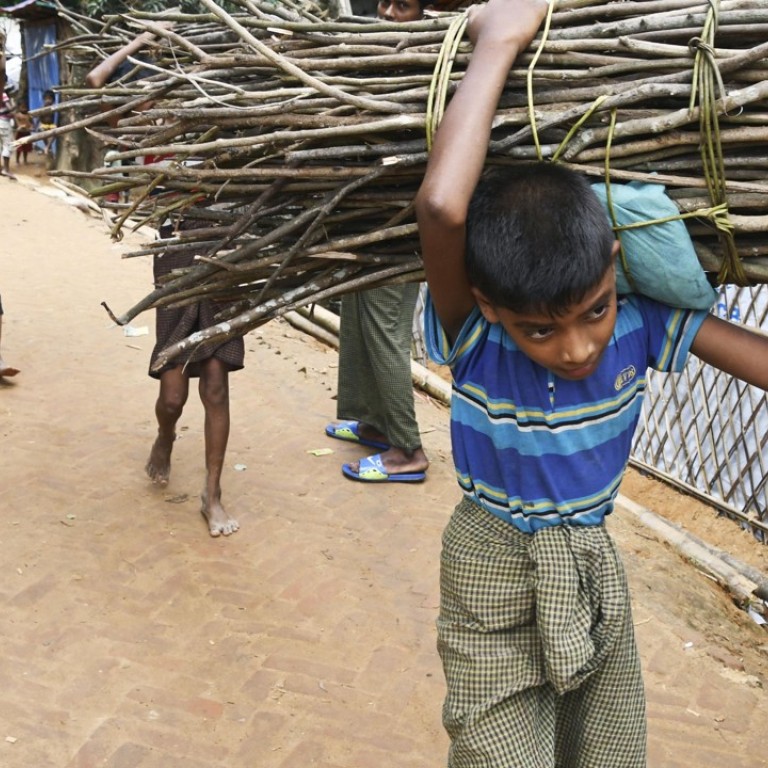
Rohingya crisis: Myanmar rejects UN report accusing its military of genocide and other atrocities
Statement comes after US report backs UN findings, with US ambassador to the United Nations Nikki Haley telling Security Council ‘the world can no longer avoid the difficult truth of what happened’
Myanmar denounced on Wednesday the findings of a UN inquiry alleging genocide by its military against the Rohingya, in a strident government response to a damning report on the crisis.
Myanmar has come under immense pressure this week over last year’s military crackdown that pushed more than 700,000 of the Muslim minority into Bangladesh.
Medecins Sans Frontieres wants legal status for Rohingya
Monday’s report by a UN fact-finding mission said there was evidence of genocide and crimes against humanity “perpetrated on a massive scale”.
In a session of the UN Security Council late Tuesday several countries – including the United States – called for Myanmar’s military leaders to face international justice.
But Myanmar on Wednesday rejected the remit of the UN mission and its findings.
“We didn’t allow the FFM [the UN Fact-Finding Mission] to enter into Myanmar, that’s why we don’t agree and accept any resolutions made by the Human Rights Council,” government spokesman Zaw Htay said according to the state-run Global New Light of Myanmar newspaper.
Zaw Htay also lashed out at Facebook for pulling down the pages of Myanmar’s army chief and other top military brass, saying that it could hamper the government’s efforts with “national reconciliation”.
The social media giant has admitted it was too slow to react to the crisis, which saw its platform – which is wildly popular in Myanmar – become an incubator of hate speech against the Rohingya.

However, Haley said that of the more than 1,000 randomly selected Rohingya Muslims surveyed in the state department’s own report, “fully one fifth” witnessed more than 100 victims being killed or injured. She said 82 per cent had seen a killing, more than half had witnessed sexual violence and 45 per cent had witnessed a rape.
“The report identifies one group as the perpetrator of the overwhelming majority of these crimes: the Burmese military and security forces,” Haley said on Tuesday, referring to the US report.
She said the Security Council must hold those responsible for the violence to account and added, “The whole world is watching what we do next and if we will act.”
Haley’s comments provided the first details of the state department report compiled from 1,024 interviews at refugee camps in Bangladesh and completed in late April.
Rohingya refugees demand justice, a year since crackdown in Myanmar began
It remained unclear when US Secretary of State Mike Pompeo planned to issue the full US report, which could have legal implications of committing Washington to stronger punitive measures against Myanmar, particularly if Washington concluded there was genocide.
The findings were originally due to be announced ahead of Monday’s UN report but have been held up by internal deliberations.
State department spokeswoman Heather Nauert said “genocidal intent” was “a very specific legal designation”.
“It is not one that is easily made,” she said.
Critics have accused Washington of an too cautious response to the Rohingya crisis, but a US official said on Monday that the UN findings could increase pressure for tougher US action.

The release of Monday’s UN report marked the first explicit UN call for Myanmar officials to face genocide charges over their campaign against the Rohingya. It said the military carried out mass killings and gang rapes with “genocidal intent” and the commander-in-chief and five generals should be prosecuted.
Washington, which had previously imposed sanctions on only one regional general over the crisis, targeted four more military and police commanders and two army units this month, but Commander-in-Chief Senior General Min Aung Hlaing was again spared.
Myanmar must face ICC for ‘murderous operation’ against Rohingya: Asean MPs
UN Secretary General Antonio Guterres told the UN meeting that the UN report deserved serious consideration and that accountability was essential for genuine reconciliation between ethnic groups in Myanmar.
Also without using the word genocide, Guterres said the report by the independent UN experts found “patterns of gross human rights violations and abuses committed by the security forces, which it said ‘undoubtedly amount to the gravest crimes under international law’.”
He said international cooperation would be “critical” to ensuring accountability.

Myanmar’s ambassador to the United Nations, Hau Do Suan, repeated his government’s contention that the Myanmar military had carried out a “logical response” to Muslim militant attacks. He said action would be taken against anyone responsible for human rights violations if there was sufficient evidence.
Guterres said the UN Security Council needed to continue to press for the release of journalists arrested for reporting on the Rohingya crisis, a reference to two Reuters reporters on trial in Myanmar.
Haley said the United States expected to see the two, Wa Lone and Kyaw Soe Oo, acquitted of all charges.
Rohingya crisis: terrorism may spread beyond Myanmar, Suu Kyi warns
Haley made no mention of Suu Kyi, who the UN investigators said had failed to use her “moral authority” to protect civilians.
China, which has been vying with Washington for influence in Myanmar, said “unilateral criticism or exerting pressure” was not helpful in resolving the Rohingya issue.
Some 700,000 Rohingya have fled the crackdown in Myanmar and most are living in refugee camps in neighbouring Bangladesh.
With reporting by Reuters and Agence France-Presse
